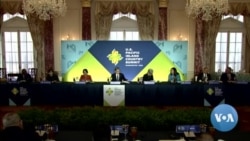The U.S. hosts its first-ever Pacific Island countries summit.
Welcome to VOA Asia Weekly. I'm Chris Casquejo at the White House. That story is coming up, but first, making headlines.
North Korea has tested ballistic missiles since Sunday in an aggressive show of force. U.S. Vice President Kamala Harris visited the demilitarized zone between the North and South this week, and the U.S. and South Korea are conducting a large-scale military exercise.
Vice President Harris said Washington would continue to deepen its "unofficial ties" with Taiwan. China responded that the U.S. needed to return to the one China policy and "unequivocally make clear that it opposes all Taiwan separatist activities."
Japanese Prime Minister Fumio Kishida held a series of meetings with foreign dignitaries in what he called "funeral diplomacy.” The dignitaries attended the controversial state funeral for assassinated former leader Shinzo Abe.
Hong Kong ended a mandatory COVID-19 hotel quarantine for international travelers, but they are still barred from restaurants and bars for three days after arrival.
Japan protested Russia’s detention of a Japanese consulate official in Vladivostok on espionage allegations, denying any wrongdoing and accusing Russian authorities of abusive interrogation.
The World Bank says economic growth in East Asia and the Pacific will weaken sharply in 2022 due to China's slowdown, but the pace of expansion will pick up next year. China constitutes 86 percent of the 23-country region's economic output.
The White House hosted Pacific Island countries for the first-ever summit of its kind with the U.S. pledging $810 million dollars to a dozen nations. As VOA’s Jessica Stone explains, the meeting comes after a spike in American diplomatic engagement in the region following China’s new security pact with the Solomon Islands.
The White House invited a dozen Pacific islands countries — including the leader of the Solomon Islands — for a summit, a first for the strategically vital region now at the heart of the U.S.-China competition.
Suzanne Vares-Lum leads the East-West Center which recently hosted more than a dozen Pacific Island leaders to discuss their most urgent challenges: economic development, post pandemic recovery and climate change.
“There's no time to waste, particularly coming out of COVID-19. People are…there are many needs in the Pacific that need to be heard.”
But it’s the issue of security that has attracted American diplomatic engagement to the region. After Beijing reached a defense pact with the Solomon Islands in May and attempted a wide-ranging agreement with the Pacific Island nations in July – island leaders have received a steady parade of U.S. officials:
Deputy Secretary of State Wendy Sherman, White House Indo-Pacific Coordinator Kurt Campbell and Vice President Kamala Harris who joined the Pacific islands forum virtually over the summer.
“The White House is doing this because there is obviously a very urgent need for the... for the United States to up its game in the Pacific.
Patricia O'Brien is an adjunct fellow at the Center for Strategic and International Studies. She says since World War Two when the Pacific islands helped the allies defeat Japan, there’s been a pattern in U.S.-Pacific engagement.
“Every time that... that America has come in any numbers, it has been because they wanted something out of the Pacific and then they have left.”
O’Brien says to overcome skepticism among Pacific Island leaders, the White House needs to demonstrate that no matter which party is in power in Washington, the Pacific will have partners in their fight against climate change.
“When we talk about Pacific regionalism, that's everyone. Climate knows no boundaries. Fish know no boundaries. Neither do currents. Neither do the impacts of climate change. So, we all need to look at it as one continent and not as small island nations but as large ocean economies and nations.”
U.S. President Joe Biden recently signed legislation to cut America’s greenhouse gas emissions in half by 2030.
Jessica Stone for VOA News, Washington.
The U.S. announced it will help address climate challenges in the Pacific with $130 million dollars in funding for programs.
Visit voanews.com for the most up-to-date stories. You’re watching VOA Asia Weekly.
Finally, for the first time in two years due to COVID restrictions, Cambodia marked the Festival of the Dead with buffalo and horse races, and offerings of food to the spirits at temples.
Hundreds gathered at a pagoda to watch about 60 ornately decorated buffalos and horses compete in the race.
People seeking luck and prosperity gather from all over the country for the two-week long festival, which ends on the 15th day of the 10th month of the Khmer calendar.
Thanks for watching VOA Asia Weekly. I’m Chris Casquejo. Until next week.











